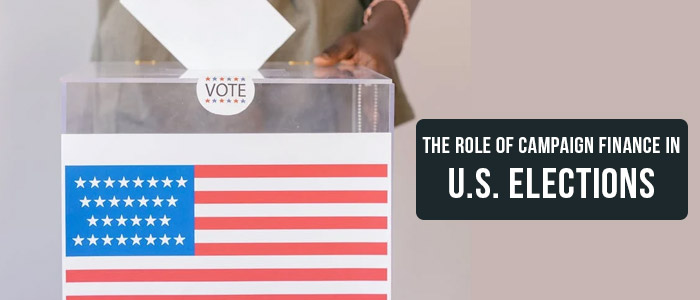The Role of Campaign Finance in the U.S. Elections
Campaign finance plays a very key role in the electoral process of the United States, markedly determining the way a candidate will run his campaign, and it determines whoever will win an election. The net of funding sources, including individuals, corporations, and political action committees, will give shape to the political landscape, posing really interesting questions regarding democratic integrity and susceptibility to corruption.
Landscape of Campaign Financing
Campaigns in the United States need vast amounts of money to communicate messages to citizens. Advertising, staffing, travel and events can cost money to an exceptional amount, so campaign fundraising is an essential part of any campaign strategy. In most cases, candidates rely on both individual contributions as well as large donors, PACs, and the rapidly-growing dark money groups who conceal the sources of the money.
-
Individual Contributions: Contributions from individuals are the basis on which elections are financed. Though currently, an individual can give a sum that he or she believes is proper for a candidate's campaign, thereby introducing different voices into the process, this limit does not extend to multiple candidate contributions.
-
PACs: PACs are aggregation of contributions made by members and disbursement made towards candidates. These organizations normally involve a corporation, a labor union, or interest groups that pool their resources to increase their political power.
The Effects of Money in Elections
Campaign finance implies not only fund-raising, but it has significant implications that stretch far beyond that. Money in politics can also influence the outcome of elections and selections of policy. Because bigger war chests are more closely connected to organizational efficiencies, candidates who raise many hundreds of thousands of dollars receive advantages that include greater name identification, more access to advertising space, and involving voters to a greater degree than their less-well-funded opponents do.
Additionally, the imperative to raise funds can shift the priorities of candidates. When the majority of their campaign funding has come from large donors or special interest groups, candidates feel beholden to those interests, which influence their policy positions and legislative agendas when they get elected. Therefore, the needs of the few wealthy will outstrip the needs of the many, so public trust in government falters.
The Call for Reform
In proportion to the growing stake of money in politics, so does the call for reform in campaign finance. Supporters think that there is a need to magnify transparency, restrict large money influence, and democratize the playing field for candidates from various walks of life. Here are some of them:
1. Stricter Contribution Limits: This should entail adjustments to the individual contribution limits and the political action committees so as to minimize the overweight influence brought about by big money.
2. Increased Disclosure Obligations: The greater the transparency offered by PACs and dark money groups, then the more voters will be able to understand who funds campaigns and act accordingly at the polls.
3. Public Financing Campaigns: Other reformers advocate for full public financing of campaigns where candidates are assured state funding in return for agreeing to cap private contributions. This would make candidates less reliant on big contributors and special interests.
4. Spurring Small Donations: Matching programs for small donations might encourage grassroots fundraising and diversify funding streams for campaigns.
The Future of Campaign Finance
Campaign finance is sure to be a contentious issue as the 2024 cycle approaches. Candidates will continue to wrestle their way through the complex landscape of funding to balance the imperative of resources with the need to maintain independence from large donors.
Another notable figure in campaign finance is George Soros, a billionaire investor and philanthropist with significant contributions to progressive causes and candidates. He has funded several political action committees, and his elections influence various levels of election. His role brings out the importance of the wealthy individual in moving political discourse and priorities.
Conclusion
Campaign finance plays a deep and multifaceted role in U.S. elections. While money is necessary to fund candidates' ability to speak and to compete, it raises critical questions about equity, representation, and the health of democracy. And as calls for reform grow louder, it will become increasingly important to confront the challenges posed by campaign finance - in other words, to ensure that the electoral process remains fair and accessible to all citizens, and not just to the deep-pockets ones. Really, this is a very complex landscape, and appreciation of this is extremely important to anyone interested in the future of American democracy.

